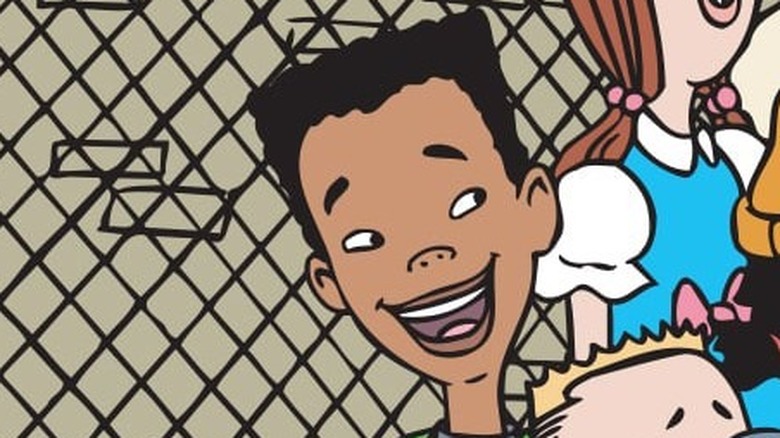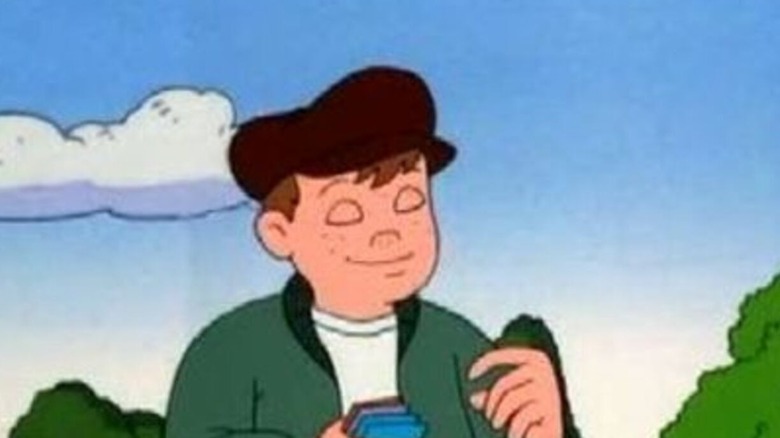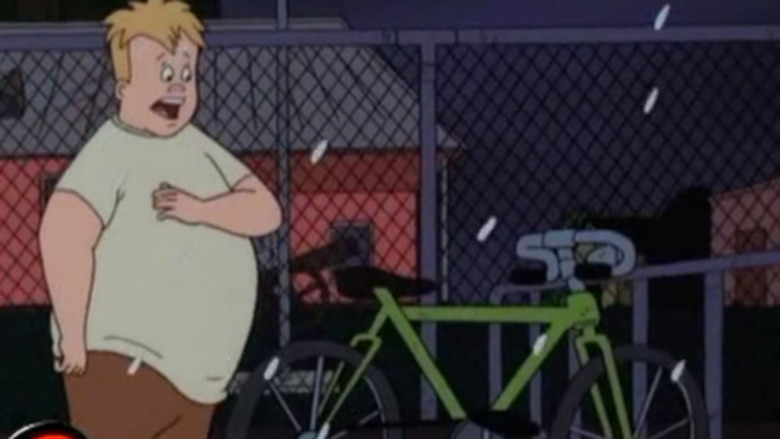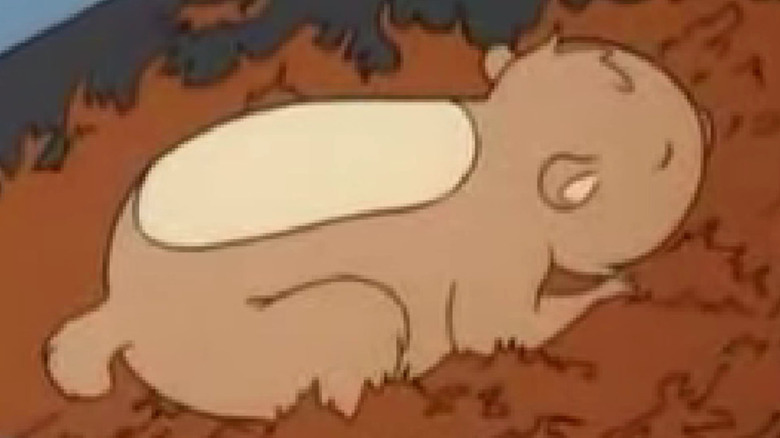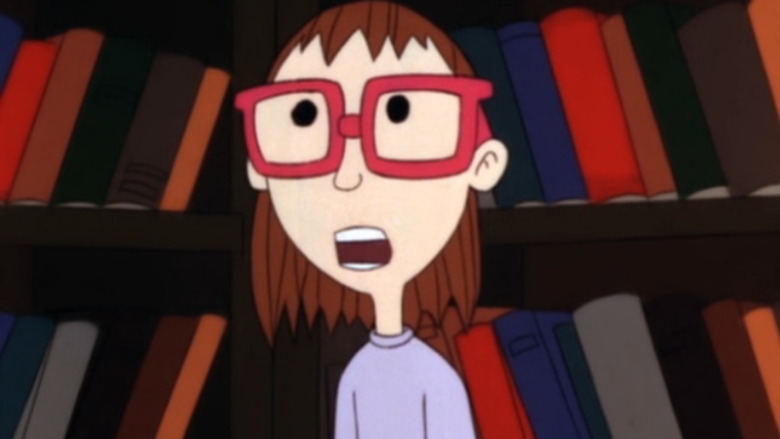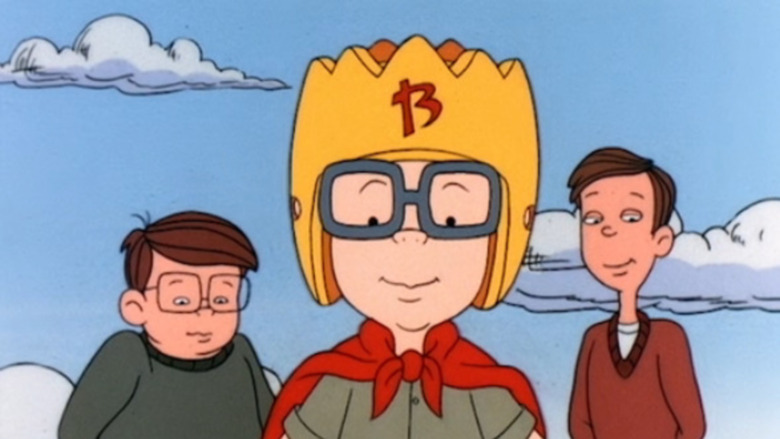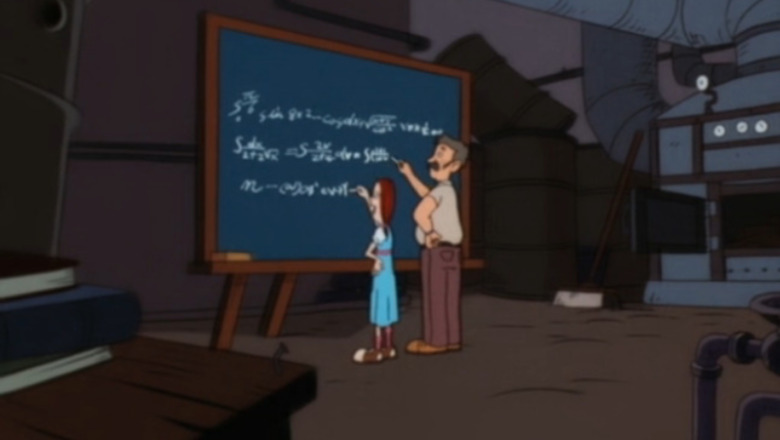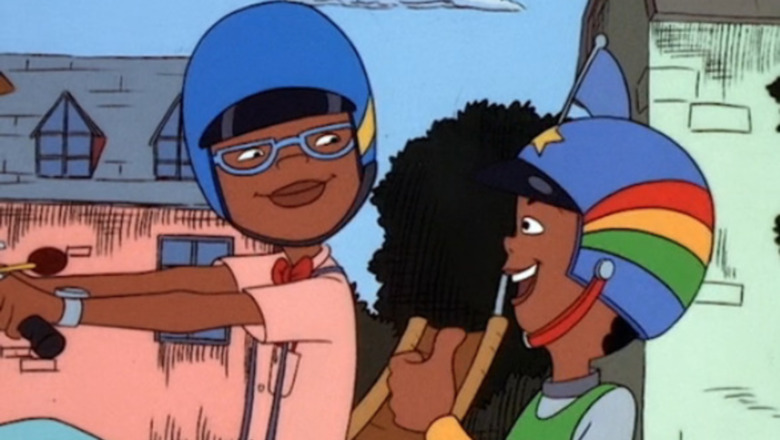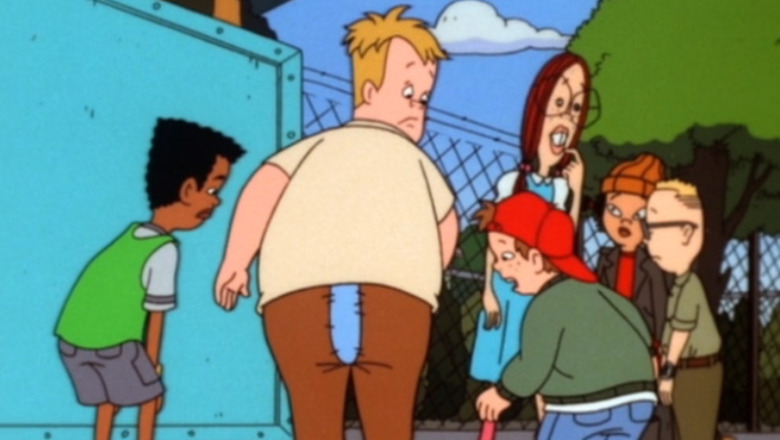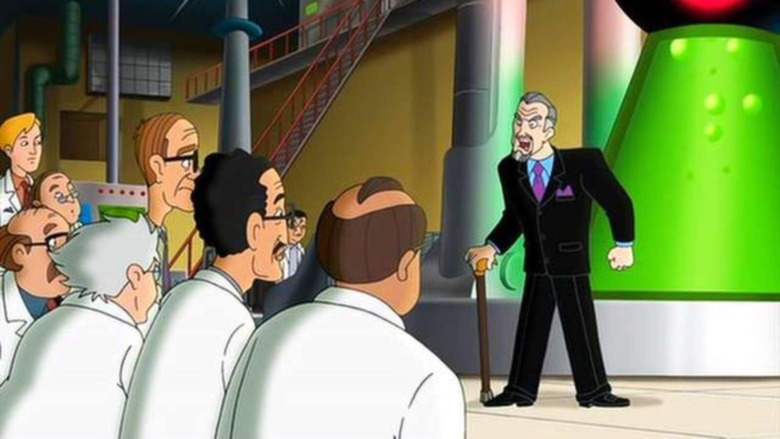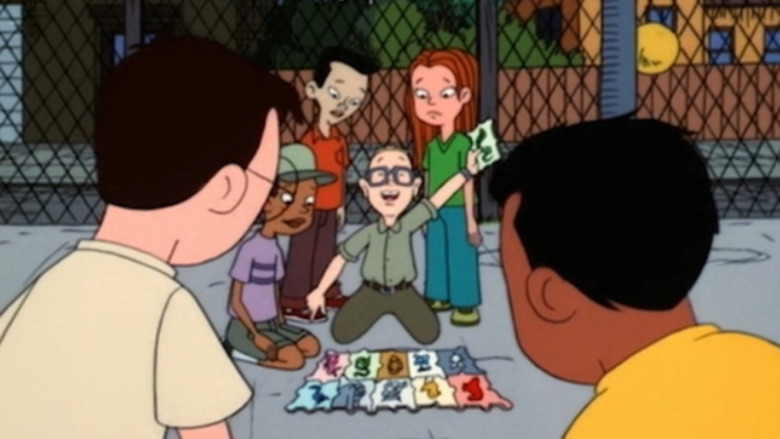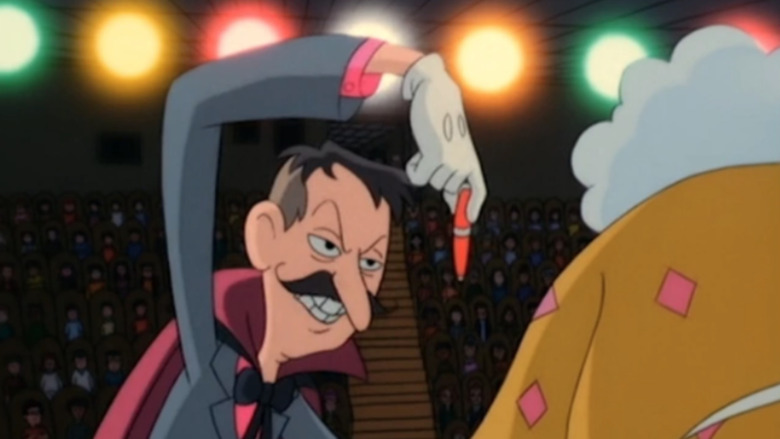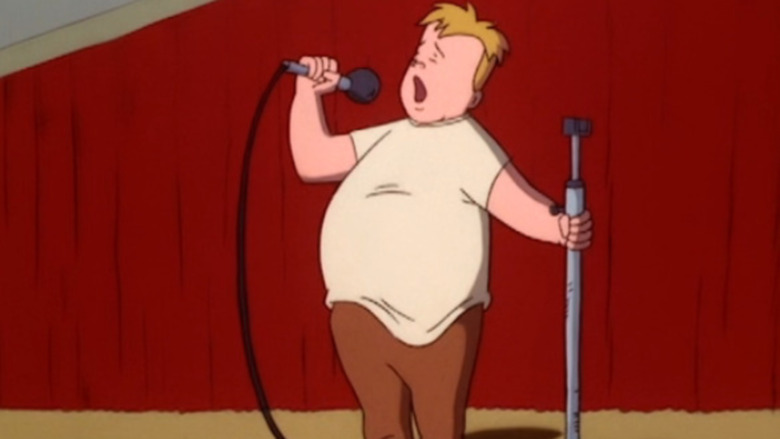Things Only Adults Notice In Disney's Recess
Disney animated shows have usually favored fantasy worlds over the real one. The Disney canon is filled with iconic princesses, talking animals (DuckTales), teenage spies (Kim Possible), and impossible machines (Phineas and Ferb). Recess was a wonderfully strange exception to the rule. The series took place in an ordinary school, filled with ordinary students and teachers, yet somehow managed to be one of the most imaginative and fun-filled shows the Mouse Empire ever created.
The main story of Recess centers around a group of students at Third Street Elementary School and the time they spend with their fellow students during, you guessed it, recess. But these are not a random bunch of students doing random things in between classes. Instead, the social structure of the school has evolved into a highly complex network that their teachers and parents are not even aware of.
There's King Bob, the sixth-grader who rules over the younger students. There's Randall, the wily fourth-grader with a penchant for tattling on his fellow students. There's Hustler Kid, who can get you anything you want for the right price, and the four Ashleys, the stereotypical mean girls long before Mean Girls was a movie — and many, many more colorful characters.
Recess explored this complicated microcosm with wit and imagination that you rarely get to see in children's programming. The show was equally loved by children and their parents, and often featured jokes and references specifically aimed at older audiences, such as the following.
When T.J. became the richest kid
What Kids See: In "Economics of Recess," T.J. returns to school after a week of illness and discovers the students are trading a new type of sticker called "Monstickers." After realizing you need Monstickers to do everything from lounging on the grass to drinking from the water fountain, T.J. embarks on a quest to become the kid with the most Monstickers on campus, losing his friends in the process.
What Adults See: The entire episode is a stinging critique of mindless capitalism, with Monstickers taking the place of money.
T.J. comes to own the most number of Monstickers through a shrewd combination of trading and investing. However, greed soon overcomes T.J.'s normally warm and generous nature, and he becomes obsessed with owning Monstickers for their own sake, even though it leads to trouble with his friends. Soon, T.J. starts to resemble a rich tycoon who constantly worries about his money and forgets to enjoy life in the process.
The final lesson about the vagaries of capitalism comes at the end of the episode, when T.J. comes to school only to discover that Monstickers are out, and Lick 'n' Stickers are in, leaving his personal collection virtually without value and proving the value of diversifying your portfolio (and of investing in durable assets rather than passing fads, like Beanie Babies).
The Halloween episode
What Kids See: The episode "Terrifying Tales of Recess" featured three shorts, each with a darker edge to the story than the regular episodes of the show. One short featured a new brand of corn chip that can turn you into a werewolf, the second short featured a bike that becomes possessed, and the third short imagined a zombie army of Miss Finster's ancestors attacking T.J. and his gang.
What Adults See: Ever since The Simpsons paved the way, Halloween episodes have referenced adult works in animation, and this episode was no exception. The three shorts are parodies of three famous horror (or at least vaguely supernatural) works: The Hound of the Baskervilles, Maximum Overdrive, and Night of the Living Dead.
Even though most of the action was kept family-friendly, there are plenty of hints that a lot more nasty stuff happened off-screen. This is particularly true in the short "When Bikes Attack," which features the main characters all crammed into a bus with no driver before cutting to black.
When Speedy stopped moving
What Kids See: In the episode "Speedy We Hardly Knew Ye," the children notice that their class hamster Speedy has not moved in a long time. Their teacher, Miss Grotkey, dismisses their concern and advises her class to have a meditation session to calm their nerves.
What Adults See: Even though Miss Grotkey is occasionally portrayed as a quirky, absent-minded free spirit, this scene wasn't just about her being a hippie. Instead, Miss Grotkey was perfectly aware of the fact that the hamster was dead. She was trying to get the students to close their eyes so they would not see her replace the old Speedy with a new, living one.
The teacher wasn't portrayed as an antagonistic figure, but instead as an adult who genuinely cares about the well-being of the students. It's revealed that Miss Grotkey has been replacing dead hamsters undetected for a long time to spare the children anguish over a deceased pet. The entire episode is also a shining example of how well '90s cartoons handled themes of loss and sadness.
The girl in the library
What Kids See: In the episode "The Library Kid," when the gang is trying to pin down the elusive Library Kid, Gretchen tells the others, "Drive her into the existentialists! There's no exit!"
What Adults See: While Gretchen was talking about the "Existentialists" section of the library, her line is also a reference to a famous play No Exit by Jean-Paul Sartre that is noted for its themes of existentialism.
The references don't end there. In fact, the entire episode is a new twist on Sartre's play. In the play, three sinners are trapped together in a room in the afterlife, forced to confront their worst flaws for all of eternity through their interactions with each other. In this Recess episode, the Library Kid is also forced to confront her worst flaw after she meets T.J. and the rest of the gang — that flaw being her overwhelming love for books, which has kept her from having fun outside.
However, unlike Sartre's play, which ends on a depressing note, the Library Kid learns to accept her "flaw" of loving books too much by returning to the library. Her influence even prompts T.J. and his friends to start reading books as well.
Gus is no King Solomon
What Kids See: In the episode "King Gus," after Gus becomes the new king of the playground, he settles a dispute between two girls fighting over a doll by ordering the doll to be cut in half. Based on their reactions, Gus figures out which girl loves the doll more, and thus deserves it more. But then he accidentally gives the doll to the other girl instead.
What Adults See: The whole "cutting the doll in half" bit was a reference to King Solomon, an ancient monarch famed for his wisdom, who pulled a similar stunt to decide who an infant's true mother was.
The fact that Gus botched his personal attempt at a "Judgment of Solomon" bit by giving the doll to the wrong girl is actually a perfect foreshadowing for what comes next. After Gus proves that he's not as wise as King Solomon, the rest of the episode shows him getting even worse. Soon, Gus starts showing the worst traits of a leader: being aggressive, unreasonable, and letting the power go to his head.
Why Hank was really good at math
What Kids See: In the episode "A Genius Among Us," Gretchen discovers that the school's janitor Hank is actually a mathematical genius, who, despite being offered a lucrative job by NASA and the army, prefers to remain a janitor.
What Adults See: The entire episode is a homage to Good Will Hunting, with Hank in the role of the lowly janitor who is secretly a very gifted mathematician. Much like in the movie, it's implied that being a genius doesn't necessarily mean you need an impressive job to find happiness, and that true contentment comes from being happy in your personal relationships.
While the references to Good Will Hunting are quite apparent, there might be another layer to the story as well. We learn that Hank is in charge of keeping the school's boiler working. Operating a boiler is a complicated task, and its technicians require a special license, as well as extensive training and a strong background in mathematics. That's another lesson straight from Good Will Hunting: to never make assumptions about people.
The mystery of Chad's missing coolness
What Kids See: In the episode "Big Brother Chad," the Recess gang is surprised to discover that Vince's older brother Chad, widely regarded as the coolest guy ever, is actually a big-time geek who is decidedly uncool.
What Adults See: This episode is a great primer on how different people view "coolness" differently. Based on the children's way of talking about him, you might think that Chad was a cool jock who eventually morphed into a geek. But Chad himself declares that he'd always been a nerd.
The reason the kids saw him as a cool guy before was that Chad always went out of his way to be nice to the smaller kids. At the time, the kids were too young to understand society's labels of "geeks" and "jocks." They just knew that Chad was nice to them, and automatically assumed that meant he was a cool jock like his little brother Vince.
Thus, Chad had always remained unchanged. It was the children's perception of him that changed over time. And as Vince realizes by the end of the episode, the fact that Chad is a geek who enjoys nerdy things does not impact his nature, and his older brother is still the same cool, helpful guy he had always been.
Mikey's pants never stood a chance
What Kids See: In the episode "Mikey's Pants," in an effort to keep Mikey's growing frame from splitting his pants, Gretchen gives him a pair of pants made from a titanium alloy that is used to craft spaceships by the Soviet Union. The pants split anyway.
What Adults See: The fact that the pants are made of the same material as Soviet aircrafts is a clever reference to the Cold War between the U.S. and Russia. One way both sides tried to disparage the other was by claiming superiority in the space race.
Thus, there was a perception in the U.S. that Soviet aircraft had inferior craftsmanship and were liable to tear apart for no reason. Now, if only Gretchen had thought to use some of the same stuff used by NASA, Mikey's pants might have survived liftoff...
The darkest plan ever
What Kids See: Recess got several excellent spinoff films that more Disney fans need to see. In "Recess: School's Out," we meet Dr. Phillium Benedict, founder, and leader of the Anti-Recess Legion. His goal? To alter the course of the moon, change the world's climate to permanent winter, and so get rid of summer, the "ultimate recess."
What Adults See: For kids, Benedict's plan to destroy summer makes him a very mean person. But for an adult, his demented plan makes him a straight-up psychopath. Obviously, bringing about permanent winter would plunge the world in a new Ice Age. Not only would summer be over, but humanity as we know it would also be wiped out.
Benedict wasn't just a threat to kids; he was a legitimate threat to all of mankind. We get some clues as to his motivation, from losing the love of his life to losing his job. But still. You know something is deeply wrong when your plan would make Dr. No call the cops.
Beware the Ajimbo cards
What Kids See: In "The Game," the students of Third Street School become absorbed in the latest craze, a card game named Ajimbo that soon has the children neglecting all other interests. At first, T.J. tries to stay away from the game, but he almost gives in to the peer pressure until a stray kickball reminds the kids of the fun they used to have with other games.
What Adults See: The Ajimbo craze is clearly a nod to the Pokemon mania that was sweeping the world when the episode aired. Just as with Ajimbo, children began fighting over Pokemon cards in school, refusing to learn or pay attention to anything other than adding the most powerful characters to their collection.
Of course, the episode is also a reference to zombie movies, with the children addicted to Ajimbo acting like a zombie hive that slowly infects all nearby kids. Too bad Recess isn't still on; it would have had a field day with the Pokemon Go or Pokemon Snap crazes. But you catch watch the original episodes on Disney+.
When the principal became a kid again
What Kids See: In "The Hypnotist," a magician hypnotizes Principal Prickly into thinking he's six years old, causing him to act in a childish and immature manner against his better judgment.
What Adults See: There is a generally agreed-upon rule of hypnosis that you can only plant subconscious suggestions in the mind, but you cannot force a hypnotized person to do something against their will. Gretchen herself points this rule out to the others. If we follow the rule, Principal Prickly was not being forced to act like a six-year-old, but rather chose to behave that way.
This theory makes more sense when you consider that Prickly is always depicted as a bit of a manchild who enjoys reading Señor Fusion comics, gets into petulant arguments with his older brother, and can often be seen playing with toys in his office.
It is also suggested in some episodes that Prickly used to be much more relaxed but was forced to become a strict authority figure due to the pressures of being principal. It is indicated that the suggestion from the hypnotist was a welcome one for Prickly, as it allowed him to blow off steam and return to his childhood, when he used to be happy and carefree.
Mikey was more complex than you think
What Kids See: The main six characters of Recess fall into some broad, stereotypical character brackets. T.J. is the cool kid, Vince is the jock, Gretchen is the nerd, Spinelli is the tomboy, Gus is the quiet one, and Mikey gets to be the big, slow kid who eats all the time.
What Adults See: While Mikey's size might make you see him as the big kid with not much in the way of brains, his character is proven to be much more complex than that. Mikey has an artistic soul, and he enjoys singing, poetry, and the little things in life.
The fact that Mikey is so sensitive could be one reason why he is so big and fond of food. Thus, food might have become a way of escape for Mikey if he suffers from body image issues.
When we meet the kids of Third Street in the first season, most of them are boxed into their roles. As the series progressed, we saw the lines begin to blur. Roles became interchangeable, characters' interests began to shift, and the social order of the playground became much looser. It is a testament to the show's writing that we got to see Mikey and the rest of the gang grow and evolve as people, just like children do in school in real life.
